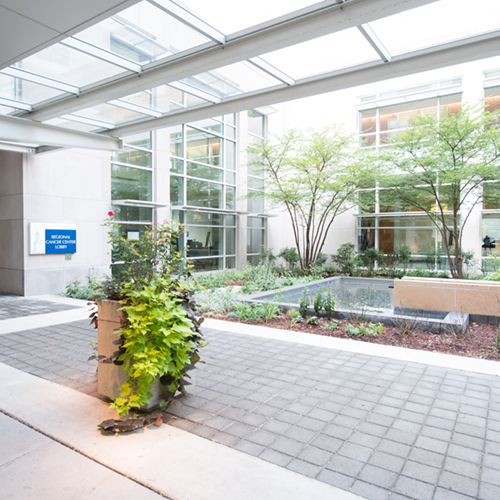
Screening with mammography is the best line of defense against breast cancer. It can help ensure early detection, higher survival rates, and less invasive treatment if cancer is detected.
Yet, according to the U.S. Center for Disease Control and Prevention (CDC), one in four women ages 50 to 74 years had not received a mammogram in the past two years in 2022. Research shows this is largely due to health-related social needs, such as food insecurity, a lack of reliable transportation, the cost of care, or housing instability.
As a certified Breast Health Center of Excellence, the Reading Hospital Breast Imaging Center and the McGlinn Cancer Institute at Reading Hospital recognize the need to assess and assist patients with any barriers that may prevent them from receiving their annual mammograms. To accomplish this, treatment options are personalized to meet the needs of each patient no matter where they are on their journey - from screening and diagnosis to treatment, rehabilitation, and survivorship.
“Breast cancer is by no means a cookie-cutter diagnosis,” Sherri Wunderlich, BSN, RN, OCN, Oncology Nurse Navigator at McGlinn Cancer Institute, said. “We meet patients when they receive their diagnosis and help connect them with the individualized resources needed so they can focus on their healing journey. I tell patients that their nurse navigator will become the best friend they never expected.”
Breast Cancer Resources
To reduce the anxiety and fear patients may experience about receiving their annual mammogram, McGlinn Cancer Institute at Reading Hospital offers support that alleviates any financial, economic, or social-emotional concerns if further care is required.
Like any important journey, it’s helpful to have a guide, and we like to call them “nurse navigators.” A nurse navigator is a registered nurse (RN) who is certified in oncology nursing and provides personalized support to patients and their families or caregivers, helping them to navigate the cancer care process and overcome obstacles to timely cancer care.
McGlinn Cancer Institute at Reading Hospital can help fill the gaps for patients seeking cancer care by connecting them with resources that meet their individual needs, including, but not limited to:
- McGlinn Cancer Institute Patient Assistance Fund - provided by the Reading Hospital Foundation.
- Transport services in partnership with Barta Bus and Uber Health Ride.
- Access to nonperishable proteins and vegetables from the facility’s food pantry.
- Convenient screening mammography on Reading Hospital’s traveling Mobile Mammography Coach - sponsored by the Reading Hospital Foundation.
- Connections to local breast cancer support groups and breast cancer ambassadors.
“We understand that everyone faces different challenges,” Michael T. Brown, MD, Medical Director at McGlinn Cancer Institute, said. “It’s imperative to us that we increase access to breast cancer screenings and raise patient awareness of the importance of early detection. Mammograms detect cancer early when it is most treatable, so they shouldn't be delayed or avoided. Thanks to the support of the Reading Hospital Foundation and The Friends of Reading Hospital, our facility is equipped with the resources necessary to help address any social, emotional, or financial obstacles a patient may face.”
More Breast Cancer Resources
It is recommended that beginning at age 40, women at an average risk of breast cancer begin their annual mammogram screenings. For patients with a family history of breast cancer, screenings should be started even earlier. We encourage you to talk with your provider to determine the best time to start screenings.
Screening mammograms are covered by most insurances and programs are available to assist eligible under- or uninsured patients. Reading Hospital is committed to saving lives through early detection, and resources are available to assist patients on their breast cancer journey - follow these links for more information:
Reserve an appointment with the Reading Hospital Mobile Mammography Coach:
- View upcoming dates and locations
- Call 1-833-34-TOWER
“Women are more likely to get their annual mammogram when their social needs are met,” Charles F. Barbera, MD, President and CEO of Reading Hospital, said. “Hospitals are the cornerstone of any community, and it’s our responsibility to help address these needs to ensure our patients have access to high-quality, equitable healthcare.”
